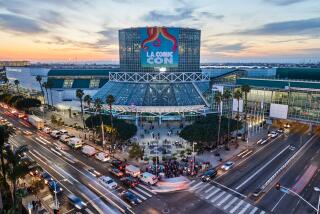Book fair draws an array of anarchists
- Share via
If the several hundred people who attended the Los Angeles Anarchist Book Fair on Sunday had been asked to explain their political identity, they would have given several hundred different answers.
They might have said they were earth liberation anarchists, or indigenous rights anarchists, or Christian anarchists. They might have called themselves feminist anarchists, insurrectionist anarchists or radical queer punks.
On the grassy hilltop of Barnsdall Art Park, where the event was held, the array of anarchists flipped through thick tomes of political theory and picked through stacks of homemade propaganda pamphlets.
There were vegan tacos, music, baby-sitting provided by the Anarchist Child Care Collective and workshops on such topics as pirate radio and “radical feminist anatomy.”
There were many conversations -- and also some arguments.
“If you were to ask, ‘What is anarchism?’ we would all disagree,” said Vlad Bliffet, a member of the collective that organized the fair. While most anarchists agree on the basic principle that the world would be better without hierarchy and without capitalism, he said, they have competing theories on how to achieve that change.
The purpose of the fair is “not just to sell stuff,” he said as he passed out schedules of the lectures. “It’s to find allies and commonalities and differences.”
The fair kicked off with a ceremony by an Aztec dance group. Wearing feather headdresses -- and in the case of several young men, high-top sneakers -- the members danced in circles to a frantic drum beat.
Judith Cuauhtemoc, the leader of the group, said the dance is traditionally performed when a farmer plants new seeds.
She said she hoped it would help spur a feeling of revolution among attendees.
Unlike Berkeley or Seattle, Los Angeles isn’t known as a nucleus for radical politics. The annual anarchist book fair in the Bay Area, for example, attracts large crowds and goes on for two days.
But what the radical political scene in L.A. lacks in potency, it makes up in diversity, said Edith Abeyta, 43, who helped organize the fair.
Not far from where she stood, at a table hosted by a local anarchist group called Brigada Popular, people sifted through a collection of homemade Spanish-language recordings of seminal anarchist texts.
Nearby, at a booth organized by the Catholic Worker Movement, people picked from a basket of “rescued candy” that the organizers had found in a trash bin outside of a supermarket.
“There’s a huge cultural and ethnic diversity here, and you can see it,” said Abeyta. “This very much reflects Los Angeles.”
The fair was hosted in conjunction with an exhibit Abeyta curated at the nearby Los Angeles Municipal Art Gallery. Many of the artists featured in the Actions, Conversations, and Intersections show “have anarchist roots,” she said.
Barnsdall Park also has a radical past, Abeyta said.
In the 1920s an oil heiress named Aline Barnsdall lived atop the property that is now the park in a sprawling house built by Frank Lloyd Wright. Barnsdall, a friend of the famous anarchist Emma Goldman, used to post billboards on Sunset Boulevard supporting Socialist political candidates, Abeyta said.
One young man was stretched out on the grass, smoking a cigarette. On the soles of his sneakers, he had scrawled, “The time for the revolution is now.” On his backpack he had pinned a sign that read, “Long Beach anarchists looking for collaborators.”
He said he had come to the book fair in hopes of meeting people like himself, a 22-year-old Dumpster-diving vegan and self-identified “insurrectionist anarchist” who believes radical system change sometimes requires violence.
He had not yet met any potential partners. But he had looked through some cool books.
The reading had him itching for action, he said, for real change. He wondered whether he should head to Latin America, where anarchist groups like the Mexican Zapatistas are active.
The problem with America, he said, is that people don’t protest.
“We don’t fight here,” he said. “We hold book fairs.”
More to Read
Sign up for Essential California
The most important California stories and recommendations in your inbox every morning.
You may occasionally receive promotional content from the Los Angeles Times.














